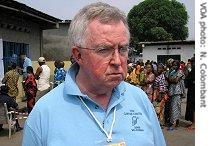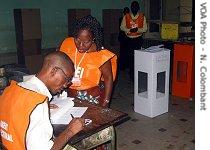Observers of Sunday's second-round presidential election in the Democratic Republic of Congo are pleading with electoral officials to ensure transparency in vote counting. The observers also criticized Congolese media for disseminating hate speech and biased coverage.
Overall, given the challenges facing the DRC, said he was pleased with what he called a major success.

Carter Center delegation leader Joe Clark
"Instances of disruption or attempted manipulation of the electoral process, while very serious in a few cases, appear at this point to be isolated and unlikely to affect the overall success of the vote," Clark said. "Polling stations were very well organized and electoral workers carried out their responsibilities competently and professionally."
But as with the first round, when results were followed by deadly clashes in Kinshasa, the compilation of tally sheets is proving to be slow and challenging.
The former Canadian prime minister urged Congo's independent election commission to do a better job.
"The commission needs to ensure timely access to official results by polling stations at all levels, so these can be cross-checked against the results collected by party poll watchers and observers," he said.
He also pleaded to the two candidates, transitional President Joseph Kabila and former rebel leader Jean Pierre Bemba, to make more appeals for calm.
Observers said it was unfortunate there were many areas in the vast Congo where the two contestants did not have party witnesses, possibly leading to inaccurate speculation over final results.
Official results are not expected before mid November.
 |
| Elections poll workers in DRC, Tuesday, Oct. 31, 2006 |
More generally, Clark said all Congolese had been let down by partial, biased and inflammatory media.
"I think the unfairness of the media here, was not particularly to one candidate or another, it was to the public," Clark said. "There is a situation in the media in Congo which does not encourage the kind of full debate that is appropriate in an election situation. We deliberately made reference to that. We specifically indicated a clear instance with regard to the national broadcaster, but the problem is more general. As I say the people who suffer the most in this case are the people of Congo who are supposed to make a clear decision."
These comments came as the government's media authority briefly shut down the state television for biased coverage. Bemba's two television stations have also been shut down.
The Carter Center said unsavory coverage from media partial to both camps contributed to violence, a lack of campaigning due to fears of more violence, and possibly lower turnout in the second round.
Earlier, European Union observers said final results may be tight, urging both candidates to respect them and avoid further violence.
Related articles
- • European Union Sanctions Rwanda and M23 Officials over Congo Conflict (March 17, 2025)
- • Canada and Germany Impose Sanctions on Rwanda for Supporting M23 Rebels (March 4, 2025)
- • European Union Suspends Defence Consultations with Rwanda (February 24, 2025)
- • Felix Tshisekedi Sworn In as DR Congo President (January 24, 2019)
- • Constitutional Court Declares Tshisekedi Winner of Presidential Election (January 19, 2019)
- • Felix Tshisekedi Vows to Be the President of All Congolese (January 10, 2019)
- • Felix Tshisekedi Elected DR Congo President (January 10, 2019)
- • DR Congo Delays Results of December Election (January 6, 2019)
- • Botswana Urges Joseph Kabila to Step Down (February 26, 2018)
- • No elections in DR Congo in December without electronic voting machines: INEC (February 13, 2018)
- • US Warns DR Congo Against Electronic Voting for Delayed Election (February 12, 2018)
- • Felix Tshisekedi accuses INEC of illegally prolonging Kabila's mandate (October 24, 2017)
- • DRC Seeks Arrest of Presidential Candidate Moise Katumbi (May 19, 2016)
- • Papa Wemba Is Buried in Kinshasa (May 4, 2016)
- • Papa Wemba Awarded Highest National Honor as Thousands Pay Tribute (May 2, 2016)
- • Rights Groups: DR Congo Must Free Pro-democracy Activists (April 13, 2015)
- • Police Open Fire on Crowd Protesting Election Law Change (January 19, 2015)
- • Denis Mukwege Wins Sakharov Prize 2014 (October 21, 2014)
- • Etienne Tshisekedi Evacuated to Belgium for Medical Treatment (August 16, 2014)
- • Kerry Calls on Kabila to Honor Constitution (May 4, 2014)
- • Kerry in DR Congo for Security Talks (May 3, 2014)
- • DR Congo Takes Chairmanship of COMESA at Summit in Kinshasa (February 26, 2014)
- • New DR Congo amnesty law welcomed by UN envoys (February 5, 2014)
- • DR Congo Honors Nelson Mandela, Hero and Model for Humanity (December 6, 2013)
- • Congo Army Takes Control of Mbuzi Hill From M23 Rebels (November 4, 2013)
- • Kabila Congratulates Congo Army for Defeating M23 Rebels (October 30, 2013)
- • UN Security Council debate focuses on peace efforts for Africa's Great Lakes region (July 25, 2013)
- • DR Congo Eases Process for Starting a New Business (June 3, 2013)
- • Regional Leaders Sign DR Congo Peace Deal (February 24, 2013)
- • The M23 Rebels Want to Overthrow Kabila? Nonsense (November 28, 2012)







